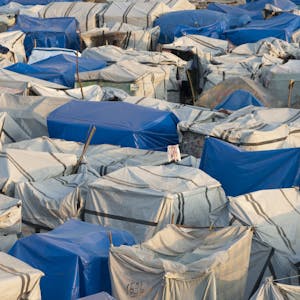The "Health in Complex Humanitarian Emergencies" course, offered by Emory University, provides comprehensive training on public health programs for acutely displaced populations in developing countries. Learners will explore the technical and management principles crucial for planning, implementing, and evaluating health programs in complex humanitarian emergencies, particularly in refugee camp settings.
The course covers topics such as assessment, nutrition, epidemiology, surveillance, and program management within the context of international relief operations. Participants will gain the skills to calculate basic epidemiology measures, develop culturally responsive public health strategies, and identify internal and external challenges affecting the delivery of essential public health services in complex humanitarian emergencies.
Certificate Available ✔
Get Started / More Info
This course comprises four modules covering essential topics such as refugees and displaced persons, healthcare in emergency phases, disease control, and program management in complex humanitarian emergencies.
This module sets the stage for understanding complex emergencies, refugees, and displaced persons. Participants will explore the top priorities, major actors, data collection, and the initial steps for engaging with the course. The module also includes readings and resources to deepen understanding and a quiz to assess comprehension.
Participants will delve into the healthcare needs of populations in the emergency phase, particularly focusing on mental health, reproductive health, food and nutrition, and water, sanitation, and hygiene. The module provides comprehensive insights into addressing these critical healthcare aspects in complex humanitarian emergencies and includes a quiz for assessment.
This module covers disease control in complex humanitarian emergencies, addressing topics such as diarrheal diseases, vaccine-preventable diseases, malaria control, infectious disease emergency response, and non-communicable diseases. A supplementary section provides a real-life example from Haiti, and participants will engage in a quiz to reinforce learning.
Program management is the focus of this module, encompassing shelter and site planning, camp management, logistics, and mental health aid worker support. Participants will gain a comprehensive understanding of managing healthcare programs in complex humanitarian emergencies, with a quiz to evaluate their grasp of the concepts.
Global Health Challenges and Governance addresses key concepts of global health, globalisation, and governance. It equips learners to understand and advocate for...
Causes of Racial Inequity in Healthcare is a comprehensive exploration of critical drivers of racial disparities in healthcare, including financing, access to care,...
This course provides evidence-informed solutions to address the opioid epidemic in the United States. It covers data sources, clinical guidelines, pharmacy benefit...
This specialization at Parsons School of Design delves into healthier building materials and sustainable practices, equipping learners to assess, select, and implement...